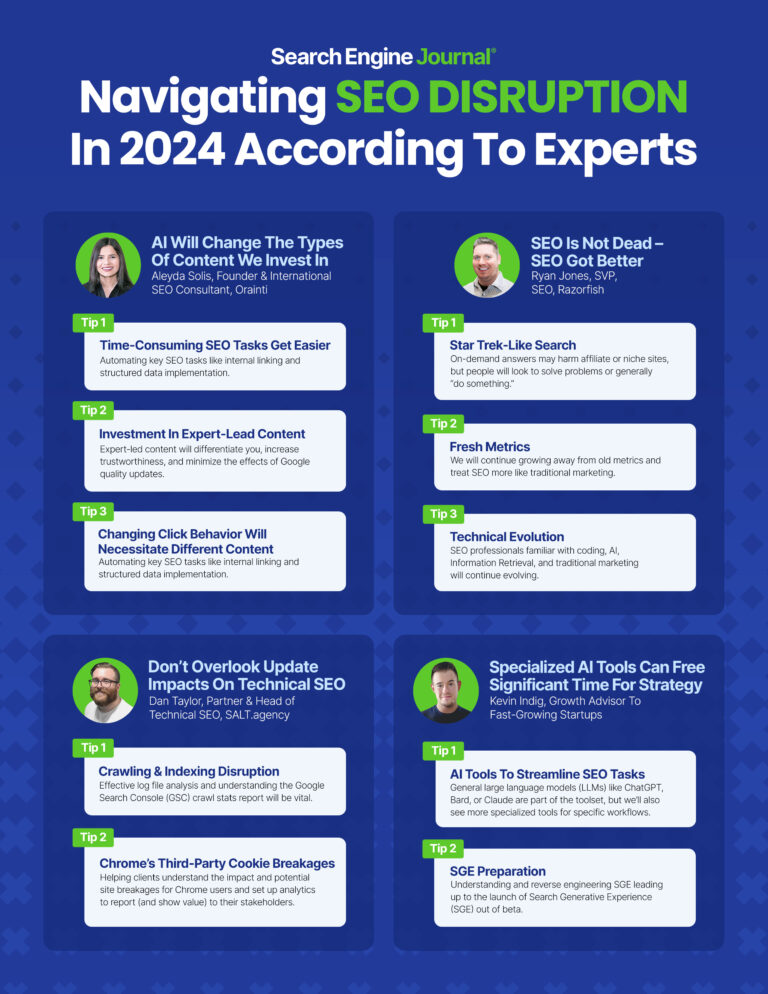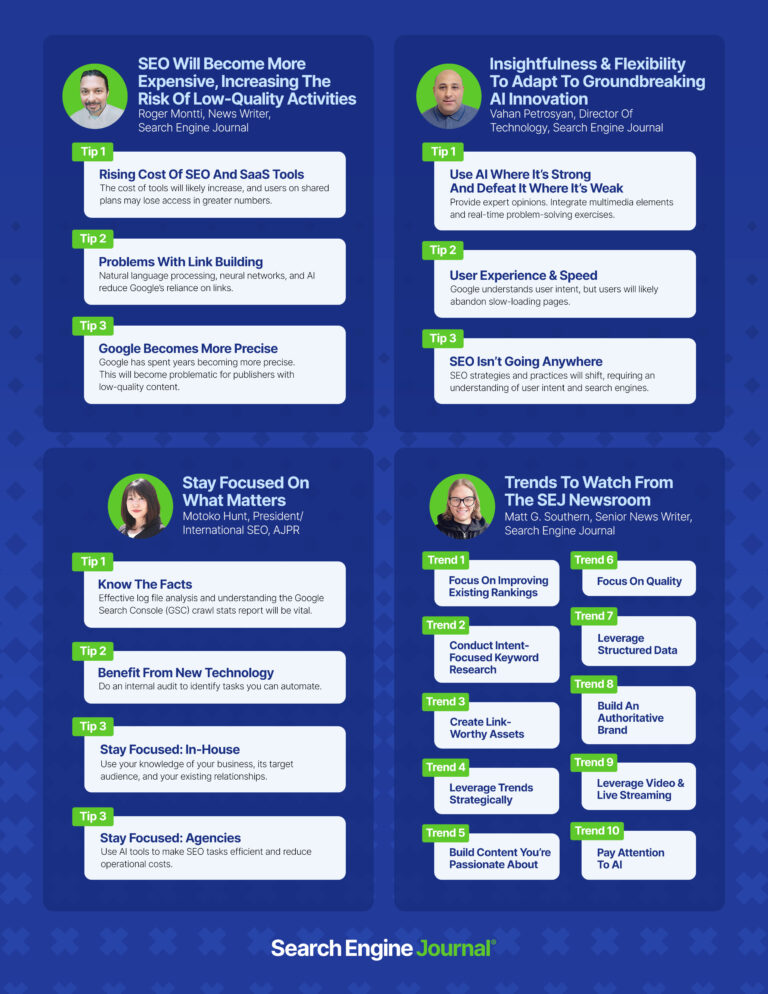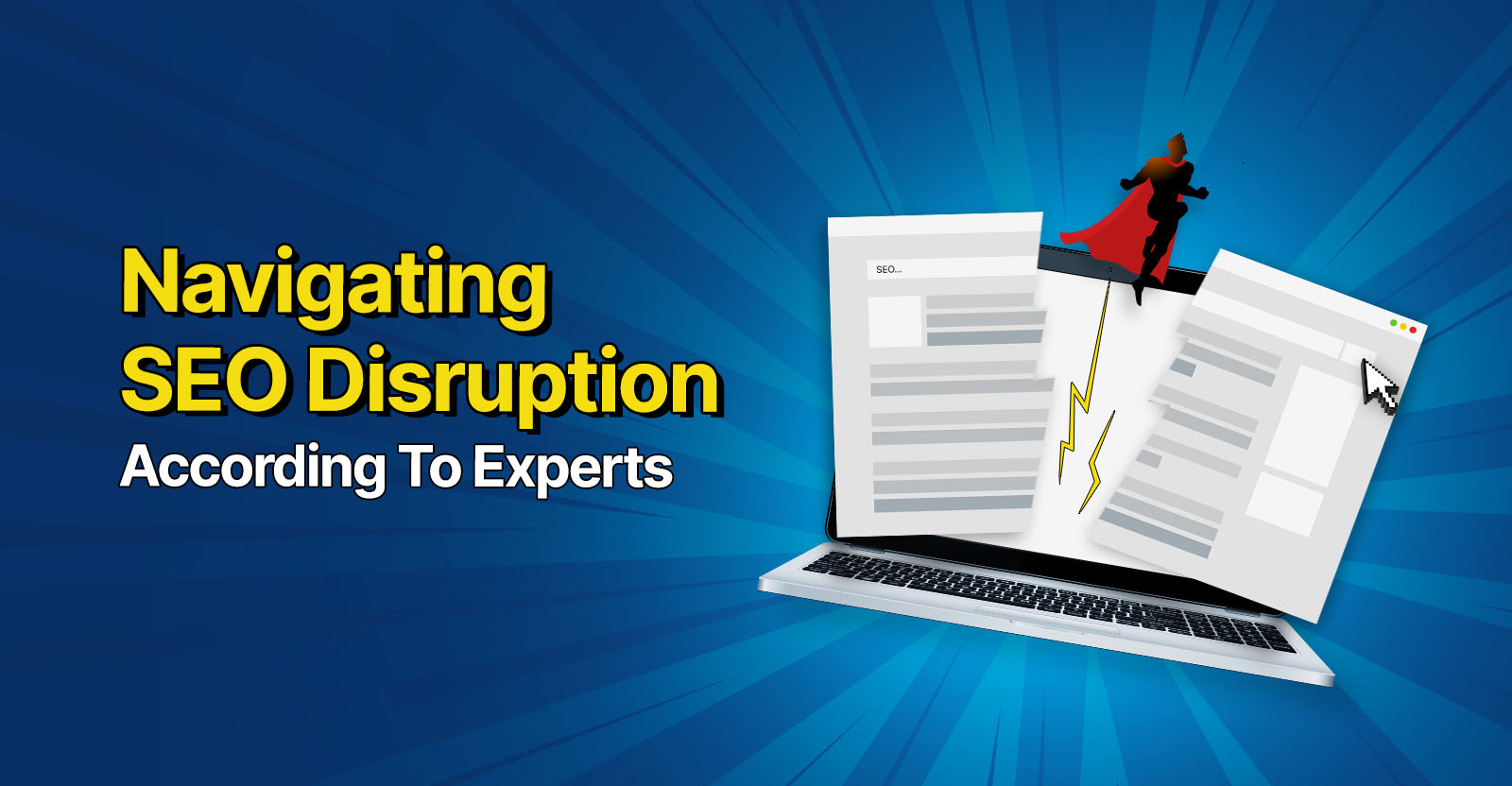This is an excerpt from SEJ’s SEO Trends 2024 ebook, our annual roundup of expert opinions on what you can expect over the course of the next 12 months.
Seeing troubled waters ahead comes with apprehension, but it’s also a gift.
As much as disruption is inevitable in 2024, calls to the death of SEO are premature.
People still need to find things, and in this editor’s opinion, the momentum behind how people have searched for information since search engines first appeared isn’t easily redirected.
The models you currently use to drive business goals with SEO may change.
Some queries never needed a click-through in the first place. This is where in-platform search experiences will hit hardest.
Many low-hanging fruit queries will turn rotten, and basic informational queries will stop performing.
But if you weren’t serving the true user intent in the first place, this would happen eventually anyway.
You need to pivot, but you have time to do it.
The key will be educating your clients or in-house stakeholders and preparing them for disruption.
You will likely see unusual performance interruptions as you turn toward new strategies. You may need to reassess which metrics are important to you and what outcomes you expect from SEO.
Just remember: It isn’t the hype where you’ll find a sound strategy. It’s your understanding of your audience and how their journeys manifest.
If I had to summarize the insights of this article in three sentences, they would be:
- Understanding a user’s true intent must guide you – spam and thin results are dying.
- Don’t forget about technical SEO – keeping a tidy site can also help insulate you from ruthless core updates.
- Use AI strategically to give yourself more time for big-picture thinking.


AI Will Change The Types Of Content We Invest In
Aleyda Solis, Founder & International SEO Consultant, Orainti

I expect the following to be key SEO trends in 2024:
Trend 1: Time-Consuming SEO Tasks Get Easier
There will be further automation of key SEO tasks thanks to AI/chatbots/generative search.
From internal linking to structured data implementation, some otherwise resource-consuming SEO execution will be facilitated further thanks to more powerful automation.
Trend 2: Investment In Expert-Lead Content
After the disruption of AI content generation, online businesses should invest in expert-led content to differentiate themselves, increase their trustworthiness, and establish their authority.
An expert-based strategy can also minimize the chances of getting hit by Google quality updates.
Trend 3: Changing Click Behavior Will Necessitate Different Content
The release of Google’s Search Generative Experience (SGE) could shift users’ click behavior in search results.
For example, rather than clicking on reviews, articles, or product landing pages, they might go directly to product description pages through SGE snapshots.
We may need to start diversifying and changing the type of content we invest in to maximize our visibility and improve user experience across the search journey.
Don’t Overlook Update Impacts On Technical SEO
Dan Taylor, Partner & Head of Technical SEO, SALT.agency

Crawling & Indexing Disruption
With all the focus on AI and the most recent fallout from the sequential Google updates (namely the helpful content update), a big focus has been on the impact on ranking.
We know that the idea of quality affects all of Google’s “SEO” processes.
Google reaffirmed this at Search Central Live in Zurich in October 2023. Right now, the SEO community focuses on “quality content,” but you should also focus on quality in terms of maintaining desired crawling and indexing rates. I think trends will shift more in this direction in 2024.
Many of Google’s systems use URL patterns to make judgments of all the URLs that follow this pattern.
This way, it can preserve resources and make judgments without crawling hundreds or thousands of URLs on a single large website. It does this for both judging quality and SafeSearch.
Crawling and indexing are expensive components of Google’s organic search.
I feel these more “ruthless” updates in recent months indicate things to come, as Google doesn’t need or want to crawl and store every piece of content on the internet. We also saw some indication of “index pruning” in 2022 in the August core update.
Effective log file analysis and understanding the Google Search Console (GSC) crawl stats report will be vital.
Prepare your clients for this, and educate your team members about it. Otherwise, brands will be blindsided by performance and ranking drops, with possible signs of crawl and indexing slowdown happening in advance.
Chrome’s Third-Party Cookie Breakages
As well as considering the impact on reporting (for showing the value of SEO) to the broader business, with Chrome moving towards the “deprecation” of third-party cookies, we also need to be activists and stewards for our clients in helping them understand the impact and potential site breakages for Chrome users.
While this isn’t strictly SEO, there’s no point driving users from organic search to a website if it doesn’t work or function as expected, and the users don’t convert.
From Q1 2024, this will be tested on 1% of Chrome users, with rollout fully anticipated before the end of the year. Test websites and highlight issues for clients now, and keep it on your radar in 2024.
In addition, help your clients set up analytics to report (and show value) to their stakeholders.
Specialized AI Tools Can Free Significant Time For Strategy
Kevin Indig, Growth Advisor To Fast-Growing Startups

The most significant trend I see for 2024 is using AI to make workflows like data analysis, keyword research, content creation, and communication magnitudes faster.
We’re facing more AI in search (even more than before), but we also get more powerful tools to strike back.
General large language models (LLMs) like ChatGPT, Bard, or Claude are one part of the toolset, but we’ll also see a lot more specialized tools for specific workflows.
The second trend is the launch of Search Generative Experience (SGE) out of beta, which I expect at the end of 2023. At the time of writing (October 2023), we don’t yet know the implications of SGE, but understanding and reverse engineering it is the second big trend of 2024.
SEO Is Not Dead – SEO Got Better
Ryan Jones, SVP, SEO, Razorfish

Be prepared for SEO to be declared dead multiple times, only to be replaced with something that looks a lot like SEO.
As generative AI develops, search engines will pivot more toward something that behaves like a Star Trek computer than providing a list of websites, giving answers on demand.
Many will struggle to accept that the user never wanted a website for some searches – they just wanted an answer.
On-demand answers may harm affiliate or niche sites, but plenty of people will still be searching to solve problems, find products, get advice, or generally “do something.”
Marketers will still work to influence the new “search experiences,” just as we work to influence search results. We may try to call it something other than SEO, but it will still be SEO at its core.
We will continue growing away from some of our old metrics and treat SEO more like traditional marketing. 2024 will be the year the entire industry takes another step forward.
SEO professionals familiar with coding, AI, Information Retrieval, and traditional marketing will continue evolving, and I’m excited to see what awesome new ideas and tools we come up with.
Don’t Get Lost In Panic Or Hype, Stay Focused On What Matters
Motoko Hunt, President/International SEO, AJPR

Is it just me, or have the updates and changes with the search engines become more frequent and drastic?
In addition to the search engine side of AI adoptions, AI tools such as ChatGPT became available to the general public.
You see mixed information about the future impact on search; it can get confusing and frustrating no matter the size of your company.
These fast-paced changes will create a massive divide among competing websites depending on how well teams can stay on top of the changes and use them to benefit.
In 2024, I recommend you keep the following three points in mind to grow your business:
Know The Facts
You must stay on top of what’s happening, but changes can come quickly. What you don’t want to do is to overreact, especially based on misinformation or one person’s opinions.
Read what the search engines and trusted industry news sources say, and don’t focus on every comment and rumor on social media.
Allocate sufficient budget for the SEO team’s education through seminars/webinars, conferences, and certification courses. Sharing knowledge with internal training programs for in-house teams or clients is also great practice.
It’s essential to know how the search results look to your target audiences, especially now that the search engines are changing the results page layout and content more frequently and drastically.
Check the search results with highly relevant queries to your business to see how the changes impact the results.
Analytics data informs the site performance, but looking at the search results also tells you much about why people do or don’t click links.
Understanding how these systems gather, and present information will enable you to pivot activities to respond to these changes as they go live.
Benefit From New Technology
Do an internal audit on tasks that take a long time and could benefit from automation.
For example, you can use AI tools, including AI-powered software services and ChatGPT, to help you check for any irregularities in your ecommerce database that feeds into the website. Or you could audit your site for duplicate and similar content.
These tools can also help cut down some of your coding and tagging work and immediately reduce your manual workload.
It is nice to see that some agencies are already creating tools with AI technology and offering them to clients. It doesn’t need to be a tool suite.
Sometimes, a tool that helps a niche area could make a big difference. Often, many websites simply need that niche challenge to be solved.
Stay Focused
If you are an in-house SEO, you know your business and its target audience very well.
This knowledge and your existing relationships are your best tools.
Improve your content by highlighting your products and services. The key is keeping sight of your business goals and not panicking with every Google update.
Agencies have two priorities: Your clients and your bottom line. Incorporate the AI tools to make the SEO work and related processes more efficient.
Leveraging AI should reduce your operational costs while helping to bring more success for the clients.
The best way to get buy-in from clients is to work closely with them by educating them.
Gaining their trust and confidence that you understand and have adapted to these changes will be the key to winning and retaining the businesses.
SEO Will Become More Expensive, Increasing The Risk Of Low-Quality Activities
Roger Montti, News Writer, Search Engine Journal
Rising Cost Of SEO And SaaS Tools

I expect the cost of tools to increase, and we may see additional users on shared plans lose access in greater numbers.
- Ahrefs recently announced it is cutting 15% of legacy users due to overuse.
- Resource usage for AI is high, which might cause providers to raise prices. For example, comparing 2021 to 2022, Microsoft used 34% more water, and Google’s water use is up 20%, both attributed to AI.
- Data center demand is at an all-time high, with some geographic areas experiencing as much as 300% data center growth.
- Google’s investment in tensor processing units (chips for AI) is estimated to cost $3 billion in 2023.
Sequoia Capital, the venture capital firm that backed companies like Apple, Airbnb, and more, recently published an article stating that 2024 is when AI will go into what it calls Act Two.
Act Two of AI expands monetization opportunities beyond content and image generation into more high-stakes businesses like medicine. Act Two goes beyond the simple text and image generation for which people currently use it.
OpenAI recently promised lower-priced plans for developers, but these plans are for technologies related to medicine and entertainment. Those new planned offerings are a part of OpenAI’s goal to expand its footprint beyond ChatGPT users.
There are estimates that OpenAI spends at least $700,000 per day, and those costs are likely higher since the original estimates were based on GPT-3.
OpenAI may raise prices for its paid ChatGPT tiers. Its costs are increasing, and it currently has no real competitors.
I believe this is inevitable, but whether it will happen in 2024 is debatable. It could be further out by another two years.
The squeeze in SEO tool pricing is already happening and will likely become more intense.
Problems With Link Building
Natural language processing, neural networks, and AI mean that Google doesn’t need to rely as much on links to identify content relevance.
In 2024, it will start sinking in that links matter less. The mainstream is mostly already on board with this reality.
People who are relatively new to SEO may not be aware that spammy link tactics like buying expired domains have existed for 20 years, and Google has had a handle on it for a long time.
But some people tend to have faith in what they think they see and wave away evidence that doesn’t conform to those beliefs. The reality will become apparent as their peers discuss how links matter less.
Link building isn’t dead. But I think many people will realize certain tactics don’t work anymore.
Google Becomes More Precise
Google has spent many years improving its precision.
That was the whole point of the Hummingbird update from 2013. It was a rewrite to make the core algorithm fast and accurate.
That emphasis on precision has never gone away. The Medic Update was also about being precise about what sites qualify for the different query topics.
BERT helped Google have a more precise understanding of language.
SpamBrain and the Helpful Content System help Google increase precision in weeding out low-quality content and promoting higher-quality ones.
If Google uses TW-Bert, it provides a more precise understanding of search queries. And this will be increasingly problematic for publishers with low-quality content.
Google’s algorithms aren’t perfect, but in 2024, we will see this trend of increasing precision continue.
Precision is the word to keep in mind.
SEO Pros Must Be Insightful & Flexible To Adapt To Groundbreaking AI Innovation
Vahan Petrosyan, Director Of Technology, Search Engine Journal
Use AI Where It’s Strong And Defeat It Where It’s Weak

2023 was groundbreaking with innovations in the field of AI, and it is evident that the role of AI in SEO is becoming more central than ever before.
AI’s growing influence in personalized search experiences is set to enhance the understanding of user intent, context, and the ability to analyze previous search histories.
This advancement will enable search engines to interpret the nuances in search queries and user behavior more accurately.
Consequently, SEO strategies will need to become more targeted, leveraging AI tools (such as Copilot in Clarity) to analyze and understand these behaviors effectively.
However, balancing this efficiency with a commitment to accuracy and ethical standards is crucial. All content generated through AI must be fact-checked to mitigate the risks of misinformation and AI biases, which is also a part of search engines’ guidelines regarding AI-generated content.
That is why – by focusing on E-E-A-T, introducing “perspectives” filters, altering rankings to prioritize content that demonstrates first-hand knowledge, and user notes in search – Google is trying to balance AI advancements with real-life experience and human touch.
Machines can’t replicate the personal insights and feelings gained from real-life experiences like product reviews. For users searching for [the best laptops for graphic designers], the real working experiences of design professionals with specific products are crucial, rather than just a generic list of potential laptop options.
But we should also admit that AI chatbots are reshaping how users interact with the web and consume content. Publishers and SEO professionals must innovate to stay competitive.
One advantage that websites still have over large language model chatbots is users still need to go the extra mile to get high-quality outputs. They have to think of a decent prompt and fact-check the response, which increases the time (i.e., “cost”) of getting information.
Given that fact, thinking about how to surpass chatbots is essential when crafting content and optimizing UI/UX. Content that is easy to consume, has a human touch, and earns trust with users, will win
. These are just a few examples of content that achieves those goals:
- Provide expert opinions and well-researched content. Reduce the user’s need to cross-check information.
- Integrate multimedia elements, data visualizations, interactive modules, quizzes, and real-time problem-solving exercises.
- Incorporate human elements into a content strategy where AI chatbots may fall short, such as live Q&A sessions or webinars where experts respond to user queries in real-time.
User Experience & Speed
Google is good at understanding user intent because it accesses extensive information about users, allowing it to produce exceptionally fast and relevant search results.
However, quick SERP generation becomes less effective if the websites are slow, as users will likely abandon slow-loading pages.
Therefore, technical SEO will be even more important for ranking and retaining users.
Google’s introduction of the new Core Web Vitals (CWV) metric – Interaction to Next Paint (INP) – which will replace First Input Delay (FID) in March 2024, confirms that.
SEO Isn’t Going Anywhere
While there are claims that SEO and technical SEO are dead, this is far from the truth, and SEO will remain a vital aspect of digital marketing.
The rise of AI doesn’t signal the end of SEO but a shift in its strategies and practices. This happened several times when Google introduced SERP features like featured snippets, People Also Ask (PAA) boxes, etc.
This shift requires a deeper, more nuanced understanding of user intent and how search engines work.
Trends To Watch From The SEJ Newsroom
Matt G. Southern, Senior News Writer, Search Engine Journal

SEO is constantly evolving, and 2024 will likely change how we think about it even more.
Based on my experience covering the SEO industry, I wanted to share some critical insights to get ahead.
Focus On Improving Existing Rankings
First, I want to emphasize the importance of improving existing ranking keywords rather than chasing new ones.
Often, websites already have a goldmine of opportunity in keywords ranking on page two or three.
Even if you rank on page one, moving up just one spot can skyrocket your traffic since the click-through rate is much higher in the top spots.
Conduct Intent-Focused Keyword Research
Intent and relevance are key when researching new keywords.
It can help to prioritize transactional, commercial keywords over generic informational ones. And ensure the keywords genuinely relate to your core products, services, and solutions.
Sometimes, we get distracted by high-volume keywords that don’t convert or drive revenue.
Create Link-Worthy Assets
Creating linkable assets is crucial for long-term SEO success. Look for ways to make your content more worthy of links by doing unique research, testing products, compiling data studies, etc.
Authoritative, quality backlinks remain among the most decisive ranking factors, so build content that people naturally want to reference and link to.
Leverage Trends Strategically
Stay on top of trends and leverage timely opportunities when they make sense. For example, publishing evergreen content about a hot topic can allow you to rank before the competition catches on.
Don’t go overboard with trend-jacking – keep it to less than 20% of your content mix.
Build Content You’re Passionate About
Create content you’re genuinely passionate about. This makes the process so much easier over the long haul. And take a long-term view – build your website as a brand, not just a quick income source.
SEO success requires expertise, experience, and establishing trust – and that takes time to build.
Focus On Quality
As Google’s algorithms advance, they will better detect genuinely helpful, expert-level content vs. content created to target keywords. Produce content that provides real value for users.
Leverage Structured Data
Structured data like schema markup helps search engines understand your content better, especially for reviews, FAQs, recipes, events, etc. This can enhance your indexing and rich snippet potential.
Build An Authoritative Brand
Become a trusted resource that users keep returning to as their go-to source for information. Provide consistent value, engage with your audience, and establish thought leadership.
Leverage Video & Live Streaming
Video content and live streaming will be more influential in 2024.
YouTube continues dominating search, and live video platforms like TikTok are changing discovery. Create engaging video content that connects with audiences.
Pay Attention To AI
As chatbots like ChatGPT evolve, they may disrupt search behaviors and content creation. Understand how users interact with AI to serve their needs.
Doubling down on high-quality, user-focused content and branding will serve you well from an SEO perspective in the next few years.
Stay nimble and open-minded as search trends evolve!
In Summary
Here are my key takeaways for SEO success in 2024:
- Leverage the low-hanging fruit on pages two and three.
- Conduct intent-driven keyword research.
- Create authoritative, link-worthy assets.
- Monitor search trends but stay focused on evergreen, high-quality content.
- Provide genuine user value over keyword targeting.
- Build brand authority and thought leadership.
- Stay agile to align with emerging technologies like AI.
- Leverage structured data to help search engines understand your content better.
- Lean into video.
More resources:
- 21 SEO Experts Offer Their Predictions For 2024
- 2024 Disruptions, AI & Content Strategies
- SEO Trends 2024
Featured Image: Paulo Bobita/Search Engine Journal





